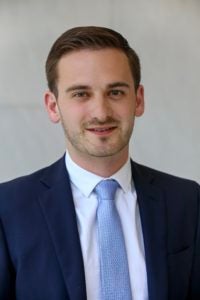
Will Todman graduated from the MAAS program in 2016. Will is originally from the UK and received his undergraduate degree in Arabic and Hebrew from Oxford University. He currently lives in Washington, DC and works as an associate fellow for the Center for Strategic International Studies’ Middle East program, conducting research on political, social, and economic issues related to the MENA region.
You wrote your thesis for the MAAS program about sieges in Syria. Can you talk a bit about your research and why you chose this focus?
In between my two years of MAAS, I carried out research for Mercy Corps in Beirut on how to get humanitarian aid to besieged areas in Syria. This got me thinking about the aims and implications of siege warfare more broadly, and Mercy Corps kindly allowed me to use the research for my thesis. The thesis explored how sieges can explain the longevity of the conflict in Syria by looking at them as a tactic of counterinsurgency and also exploring how they fit into, and reinforce, the war economy that has spread throughout Syria during the conflict.
How has your experience in the MAAS program carried into your career?
I continued to look into siege warfare in Syria and gave a talk about it at CSIS. I also published an article on the topic in the Syria Studies journal and I am now a fellow of the Centre for Syrian Studies at St. Andrews University, writing for them on a monthly basis. But beyond that particular area of research, I use the broader knowledge I gained in the MAAS program on a daily basis. When I start a new research project, I often know which scholars I should turn to first because of readings I did in MAAS classes, and I even go back and look at notes from various classes! I also use the language skills I developed during the MAAS program on a daily basis – having Arabic and Persian helps me follow local media no end.
Your program works to highlight underreported trends in the Middle East. Can you talk a little bit about the process of how you find out about these trends and how you write on them?
My program’s director believes that the Middle East is far more complicated (and interesting) than how most media outlets portray it. We scour local media sources for tidbits of information that haven’t made it into the English media yet but which show a different side to the region. Ultimately, our aim is to make our work relevant to a policymaking audience and so we attempt to highlight these trends’ policy implications. For example, I came across an interview with an awesome female plumber in Cairo and after digging a bit, I found that governments across the Middle East—including Saudi Arabia—are encouraging women to go into traditionally male-dominated fields. I then wrote a short piece about why that may be the case.
What has been your favorite project thus far and why?
I’m working on a year-long project that is looking into the factors that contribute to the success of self-determination movements after they achieve independence. A lot has been written about why these movements succeed or fail in gaining independence, but we couldn’t find much about their prospects beyond that point. We formed an advisory board of former senior diplomats, military officials, academics, and humanitarian workers, and they bring fascinating insights and wisdom. Although the project is certainly relevant to parts of the Middle East, including Kurdistan, the scope is much broader. The project will culminate in publishing a book and will produce policy recommendations which will hopefully be relevant to a variety of actors in the United States and beyond.
What is one of the most challenging parts of your job? Most rewarding?
We attempt to straddle the worlds of academia and government and one of the most challenging things, I think, is working out how we can most usefully do that. It probably isn’t by pushing out yet another article on a major development in Syria. Instead, I try to follow local news in the region and also read as much of what people here in the United States are writing as I can. Then, I try to identify disconnects between the two or connect dots that others don’t seem to have connected. Once we’ve identified an under-discussed topic, we then have to hope that policymakers will find value in what we write. It’s certainly a challenge to identify things that are really useful, but it’s very rewarding when we get positive feedback.
What advice do you have for current MAAS students?
The range of classes that MAAS offers is amazing. I would encourage current students to take some classes slightly outside of their primary focus, because a broader understanding of the region can only be a good thing. I’m also a huge proponent of writing a thesis (and doing fieldwork, if possible). If you do write a thesis, think about how you can repackage parts of it as standalone articles and try to get them published in a range of different outlets. Having a range of publications on my CV helped me no end.
By Rachel Gray
Rachel Gray interned at CCAS as National Council on U.S.-Arab Relations Fellow in 2017.